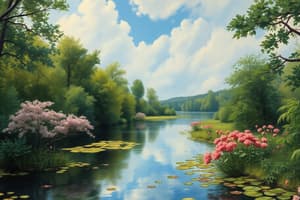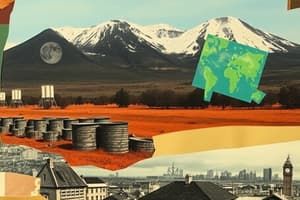Podcast
Questions and Answers
How does soil texture influence water retention?
How does soil texture influence water retention?
What is a primary environmental impact of monoculture?
What is a primary environmental impact of monoculture?
Which is a method used to prevent soil erosion effectively?
Which is a method used to prevent soil erosion effectively?
What differentiates MEDCs from LEDCs regarding population growth rates?
What differentiates MEDCs from LEDCs regarding population growth rates?
Signup and view all the answers
What is a drawback of using incineration for solid domestic waste disposal?
What is a drawback of using incineration for solid domestic waste disposal?
Signup and view all the answers
Which Environmental Value System emphasizes the intrinsic value of ecosystems over human needs?
Which Environmental Value System emphasizes the intrinsic value of ecosystems over human needs?
Signup and view all the answers
What type of pollution is characterized by being emitted from a single identifiable source?
What type of pollution is characterized by being emitted from a single identifiable source?
Signup and view all the answers
Which of the following is NOT a consequence of climate change?
Which of the following is NOT a consequence of climate change?
Signup and view all the answers
What is the definition of sustainability as per the Brundtland Report?
What is the definition of sustainability as per the Brundtland Report?
Signup and view all the answers
Which of the following stages of the water cycle is most affected by deforestation?
Which of the following stages of the water cycle is most affected by deforestation?
Signup and view all the answers
In the context of water scarcity, what distinguishes physical scarcity from economic scarcity?
In the context of water scarcity, what distinguishes physical scarcity from economic scarcity?
Signup and view all the answers
What is the primary sustainability issue associated with aquaculture?
What is the primary sustainability issue associated with aquaculture?
Signup and view all the answers
Which type of equilibrium describes a system that remains constant unless disturbed?
Which type of equilibrium describes a system that remains constant unless disturbed?
Signup and view all the answers
Flashcards
Soil texture and water retention
Soil texture and water retention
Different soil textures (e.g., sandy, clay) hold varying amounts of water. This impacts plant growth and overall soil fertility.
Extensive vs. Intensive farming
Extensive vs. Intensive farming
Extensive farming uses less labor and input per unit of land, while intensive farming uses more labor and resources for higher yields.
Monoculture environmental impact
Monoculture environmental impact
Planting only one type of crop reduces biodiversity and makes the food system more vulnerable to pests or diseases.
Landfill disposal method
Landfill disposal method
Signup and view all the flashcards
Ecological footprint
Ecological footprint
Signup and view all the flashcards
Environmental Value Systems (EVS)
Environmental Value Systems (EVS)
Signup and view all the flashcards
Dynamic Equilibrium
Dynamic Equilibrium
Signup and view all the flashcards
Sustainability
Sustainability
Signup and view all the flashcards
Point Source Pollution
Point Source Pollution
Signup and view all the flashcards
Water Cycle
Water Cycle
Signup and view all the flashcards
Resilience (System)
Resilience (System)
Signup and view all the flashcards
Physical Water Scarcity
Physical Water Scarcity
Signup and view all the flashcards
Aquaculture vs. Fishing
Aquaculture vs. Fishing
Signup and view all the flashcards
Study Notes
Environmental Systems and Societies (ESS) Study Notes
Unit 1: Foundations of ESS
- Environmental Value Systems (EVSs): Three main types - ecocentric, anthropocentric, and technocentric. Apply these perspectives in case studies and consider different responses to disasters like oil spills.
- Disasters & Media: Explore how disasters (e.g., Chernobyl, BP Oil Spill) and media coverage influence environmental consciousness and policy changes.
- Systems & Equilibria: Identify steady-state, static, and dynamic equilibrium. Understand resilience and tipping points – the point of irreversible change within a system.
- Pollution: Categorize pollution as point source/non-point source or persistent/biodegradable. Explore ecosystem impacts of various pollutants.
- Sustainability: Define sustainability per the Brundtland Report – meeting current needs without compromising future generations. Understand indicators like ecological footprints and carrying capacity.
- Climate Change: Understand climate change causes (greenhouse gasses, deforestation, industrialization) and consequences (rising sea levels, desertification, biodiversity loss). Practice connecting causes & consequences to case studies.
Unit 4: Water Systems
- Water Cycle & Human Impact: Review the water cycle and associated human impacts—deforestation, urbanization, and dam construction.
- Water Scarcity & Conflicts: Differentiate physical and economic water scarcity. Examine case studies like Nile River conflicts or groundwater overuse.
- Aquatic Food Production: Compare wild-caught fishing with aquaculture. Discuss sustainability issues including overfishing, bycatch, habitat destruction, and aquaculture pollution.
- Water Pollution: Focus on plastic pollution, its sources, impacts (like microplastics in food chains), and mitigation strategies.
Unit 5: Soil Systems & Food Production
- Soil Systems & Texture: Understand soil texture triangles, soil types (clay, silt, sand), and the relationship between texture, water retention, and fertility.
- Terrestrial Food Production: Compare extensive and intensive farming. Explain monoculture impacts, deforestation, and pesticide use.
- Soil Erosion & Degradation: Recognize factors causing soil erosion (deforestation, overgrazing) and unsustainable farming practices. Explain methods for prevention (like contour plowing, afforestation, and crop rotation).
Unit 8: Populations and Resources
- Population Growth: Compare population growth rates and resource demands in MEDCs and LEDCs.
- Ecological Footprint: Understand ecological footprints, how they illustrate unsustainable resource use, and how to calculate them.
- Solid Domestic Waste (SDW): Compare different disposal methods (landfill, incineration, recycling, composting). Discuss their environmental implications, including land use, greenhouse gas emissions, and resource conservation.
Studying That Suits You
Use AI to generate personalized quizzes and flashcards to suit your learning preferences.
Description
Test your knowledge on the foundations of Environmental Systems and Societies (ESS) in this quiz. Explore concepts such as Environmental Value Systems, the impact of disasters on policy, pollution types, and the principles of sustainability. Perfect for students looking to reinforce their understanding of environmental systems.




